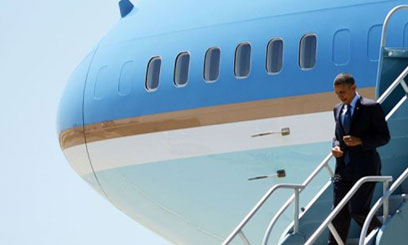The new US blueprint seeks to boost trade, strengthen peace, security and good governance and bolster democratic institutions, and is designed to help Africa’s increasingly youthful population lead its development.
“As we look toward the future, it is clear that Africa is more important than ever to the security and prosperity of the international community, and to the United States in particular,” Obama said.
The plan was unveiled nearly three years after Obama, whose father was Kenyan, laid out his priorities for the often crisis-scarred continent in Ghana, on the sole trip of his presidency so far to sub-Saharan Africa.
It comes as Washington, tooling a foreign policy towards trade and development, also views Africa’s intractable conflicts with concern, including in areas ripe for extremists to exploit, including in Somalia and even Mali.
The Washington Post reported Thursday that the US military was expanding spying across Africa, using small private planes operating from isolated bush airstrips, as part of a “shadow war” against Al-Qaeda and affiliates.
While Obama has battled multiple crises during his presidency, from Iran to North Korea and Libya to Syria, his Africa policy has garnered less interest: his Ghana trip was his only one to sub-Saharan Africa since taking office.
But his administration Thursday touted “successes” from helping restore democracy in Ivory Coast, helping nurture the new state of South Sudan, backing efforts to restore stability in Somalia and engaging young African leaders.
The president also sent 100 US special forces troops to train African forces chasing Joseph Kony, the leader of the Lord’s Resistance Army, which is known for gross human rights abuses including rape and the use of child soldiers.
In addition, Obama has several times responded to humanitarian crises in the Horn of Africa and the Sahel, and the president invited the leaders of Benin, Ethiopia, Ghana and Tanzania to the G8 summit at Camp David.
In a prelude to the new strategy, Obama warned “the United States will not stand idly by when actors threaten legitimately elected governments or manipulate the fairness and integrity of democratic processes.
“We will stand in steady partnership with those who are committed to the principles of equality, justice, and the rule of law,” he said.
Obama has also highlighted food security challenges, and in May unveiled a scheme designed to lift 50 million people, including in Africa, out of poverty by linking up governments, civil society groups with the private sector.
He also maintained former president George W. Bush’s Emergency Plan for AIDS Relief (PEPFAR), which has improved life expectancy on the continent and will support lifesaving treatment for six million people by the end of next year.
The new strategy will notably seek to encourage the “stunning” potential of economic growth to lift millions out of poverty in a continent more often associated with famine, poverty and strife, a senior US official told AFP.
It commits Washington to encourage legal and regulatory reforms that could spur investment and trade and improve economic governance, and to promote regional economic integration that could reduce costs and offer scale benefits.
The strategy also commits the administration to work to improve Africa’s food security and public health and to promote opportunities for women and young people.
The freshened focus on Africa comes as China increasingly funnels investment toward the continent, seeking to bolster its diplomatic footprint partly as a way of slaking its growing economy’s thirst for new energy sources.
China is bringing “incredibly needed” capital to needy African economies, and could play a role in bringing lasting peace to Sudan, the official said.
But some analysts worry that China’s billions of investment dollars, often spent on infrastructure projects, do not come with the same good governance strings attached as US and European help, and could prop up repressive regimes or frustrate a push toward democratic development.
Bilateral trade between China and Africa reached over $120 billion in 2011, a jump from less than $20 billion a decade earlier.












































